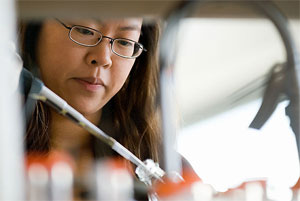
A student in the Cellular and Molecular Biology (CMB) graduate program works in a research lab at the Microbial Sciences Building in 2007.
From the biology of plants and the biology of cancer to immunology and virology, graduate students in the Cellular and Molecular Biology (CMB) graduate program at the University of Wisconsin-Madison explore the inner working of life on the planet.
Students, alumni and faculty celebrate the program’s 50th anniversary Friday, May 27, with a day of presentations and time to reconnect. With the celebration, CMB also will announce a new fund created to support a lecture series that brings successful alumni back to campus each semester. CMB graduates have excelled in many different areas and become leaders in everything from academic science and biotechnology to science editing, program Chair Bill Bement said.
“One of the most essential components of graduate education, particularly for a broad-based program like CMB, is exposure to excellent outside speakers in a variety of disciplines,” Bement said. “The program has graduated PhDs who have taken an enormous variety of different career paths in an enormous variety of different places.”
Several notable graduates are returning and will discuss their work during the anniversary celebration in Memorial Union.
- Raymond Erikson (BS ’58 ALS, MS ’61 and PhD ’63 L&S), the program’s second graduate and a Lasker Award winner, will present a scientific talk about his work with the enzyme polo-like-kinase required for cell division. Erikson is the American Cancer Society Professor of Cellular and Developmental Biology at Harvard University.
- Jean Schwarzbauer (PhD ’80 ALS) is a professor of molecular Biology at Princeton University. She studies and will discuss the molecular basis of extracellular matrix-dependent control of cell behavior. The extracellular matrix is essential for the normal function and organization of all tissues.
- Christopher Kintner (BS ’76 ALS, PhD ’81 L&S) will be the keynote speaker. He is a professor in the Molecular Neurobiology Laboratory at the Salk Institute in California. He studies the molecular events that occur in the formation of the nervous system during embryonic development. They include the formation of the neural plate, which gives rise to the neural tube and, eventually, to the entire brain and nervous system. Defects in neural tube formation are responsible for a number of human birth defects, including spina bifida.
CMB is one of the largest biology graduate programs on campus and one of the top molecular biology programs in the country. The program includes 119 graduate students, who work with more than 173 faculty trainers from more than 40 departments. Since it is not connected to one department or college, the multidisciplinary program exposes students to a broader scientific training, Bement said. CMB has awarded 558 PhD degrees since 1961.
The various colleges that train the students also support the program financially, Bement said. With limited funding, the budget is only approved a year at a time. Additional private funding would allow CMB to recruit more of the top biology graduate students.
The 50th anniversary presentations and poster sessions are available to the public, although registration is closed for meals.
